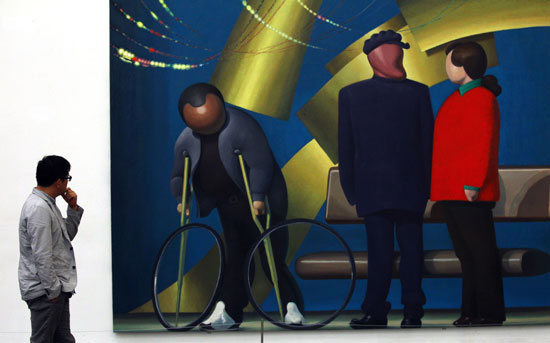Paintings reflect artist's exploration about social changes
 |
|
Wang Xingwei's oil works include figure painting and other themes.| Zou Hong / China Daily |
A quiet artist, Wang Xing-wei has been fascinated with paintings since he was a child.
"I don't have a special style. I follow my own logic," he says in an interview at Beijing's Ullens Center for Contemporary Art, where he is holding an ongoing exhibition.
The show covers a group of paintings, which highlights Wang's career in the past two decades. The works illustrate both the depth of his talent and his exploration about social changes.
In the past two decades, Wang has created an artistic universe of his own. It is humorous, weird and even slightly frightening.
Under his brush are images of various professions, such as nurses, golfers, airline stewardesses, stage performers and children playing games.
He also likes to paint animals including penguins and pandas.
Wang says his days in Shenyang Normal University was lonely and he felt isolated, even though it was his native city.
And although he grew up amid the 1985 New Wave period, a time when Chinese contemporary art started to embrace the Western and conceptual features, his training was not up to date.
But he always tries to reflect the social phenomena in his creation process.
An artist who is reluctant to talk about his work, Wang says he prefers to let his paintings speak for themselves.
Organized by UCCA Director Philip Tinari, the exhibition is Wang's first major institutional exhibition.
Comprising 74 works, beginning with My Beautiful Life of 1993, the exhibition features a maze-like, non-chronological arrangement, in which the space is divided into three major sections based on the relationship of the painter or viewer to the figure depicted: rear views, profiles, and frontal views.
Most of the works on view have been borrowed back from private collections in Europe and throughout China.


















